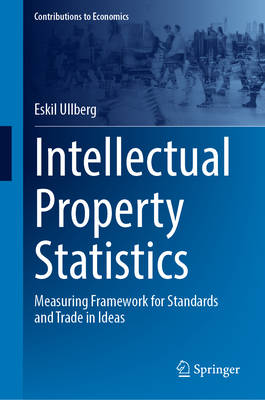
- Retrait gratuit dans votre magasin Club
- 7.000.000 titres dans notre catalogue
- Payer en toute sécurité
- Toujours un magasin près de chez vous
- Retrait gratuit dans votre magasin Club
- 7.000.000 titres dans notre catalogue
- Payer en toute sécurité
- Toujours un magasin près de chez vous
Description
Patents and other intellectual property (IP) rights are increasingly part of cross-border trade in their own rights. Patent transfers and patent licensing between inventors, investors and innovators create new business strategies of cooperation in the creation of new technology - increasing the productivity in the stock of technology assets - and efficient "distribution" of these rights. The rights bundles are then used - also increasingly - in products and services being traded cross-border, furthering economic efficiency created by this cooperative strategy. Today's international trade statistics, however, lack statistics explicitly on trade flows from ideas, based on IP rights. This book offers an idea based statistical framework to measure IP, (i.e., increasingly depends on trade in ideas) and explores ways to introduce the framework into international standards. Specifically, it offers a theory of value to measure the flows from IP and an asset view of IP to deal with allocation of resources and who owns these rights. This is then contrasted with the current way IP is treated and a "gap analysis" is used to identify what needs to change in the standards. This new framework can help develop theories, policies, practices and inform the decisions needed to better leverage the human capital formation of inventors everywhere.
Praise for Intellectual Property Statistics...
"In this book, Prof. Ullberg has undertaken a Herculean task - to lay out a paradigm for the collection of IP Statistics to ensure that the ... market of trade in ideas has the information and data necessary to function well.
[the] volume should be viewed as a starting point, a work in progress, but an important one that could very well influence the development of this important set of data on trade in ideas.
At a time when global issues ... require both new ideas and the spread of those ideas widely to help ensureboth economic growth and continued global economic convergence data that helps us monitor and evaluate what is happening in trade in ideas will be extremely valuable."
- Robert Koopman, American University, Washington, DC, USA and
Former Chief Economist, World Trade Organization, Geneva, Switzerland
Spécifications
Parties prenantes
- Auteur(s) :
- Editeur:
Contenu
- Nombre de pages :
- 184
- Langue:
- Anglais
- Collection :
Caractéristiques
- EAN:
- 9783031363856
- Date de parution :
- 02-09-23
- Format:
- Livre relié
- Format numérique:
- Genaaid
- Dimensions :
- 156 mm x 234 mm
- Poids :
- 467 g







